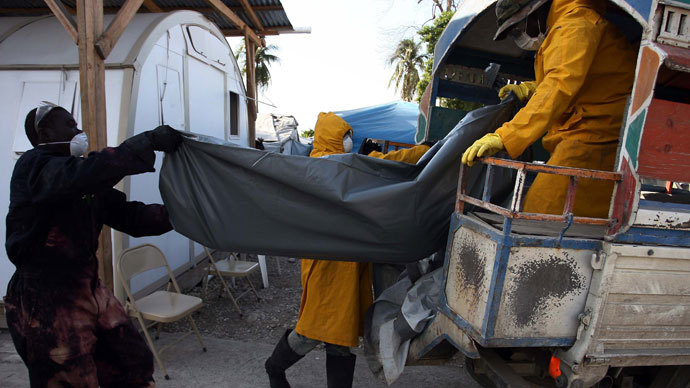UN faces lawsuit over Haiti cholera deaths

Victims of a Haitian cholera epidemic said on Wednesday they were filing a lawsuit against the United Nations, while the world body says it is immune from such legal claims.
The Boston-based human rights group Institute for Justice and Democracy in Haiti (IJDH) said it will file a compensation claim against the world body on Wednesday over a cholera epidemic that has killed over 8,300 people and sickened more than 650,000 since October 2010.
"The plaintiffs include Haitians and Haitian Americans who contracted cholera themselves as well as family members of those who died of the disease," the Institute for Justice and Democracy in Haiti said in a statement.
No details were given about the amount of compensation the victims were seeking.
In November 2011, the IJDH filed a petition at UN headquarters seeking at least $100,000 for the families or next-of-kin of each individual killed in the epidemic and a minimum of $50,000 for each victim who suffered illness from the outbreak.
The United Nations, however, said it would not pay hundreds of millions of dollars in compensation claimed by the cholera victims.
An independent panel appointed by UN Secretary-General Ban Ki-moon to study the cholera outbreak issued a 2011 report that did not hold the Nepalese peacekeepers responsible for the deadly epidemic.
Ban's spokesman Martin Nesirky said in February of this year that the United Nations advised the legal representatives of the cholera victims that "the claims are not receivable pursuant to Section 29 of the Convention on the Privileges and Immunities."
A report by the US Centers for Disease Control and Prevention, however, challenged the UN stance, saying the epidemic was likely brought to the Caribbean country by the UN peacekeepers when contaminated sewage was discharged from their living quarters into a waterway.
Before that, cholera, an infection causing severe diarrhea that can lead to dehydration and death, had been rare in Haiti.
UN Secretary General Ban Ki-moon launched a $2.2 billion initiative in December 2012 to rid Haiti of cholera over the next decade.
Meanwhile, there has been some difference of opinion on the question of compensation for the Haitian victims.
On Tuesday, a UN official broke with the ranks and argued on behalf of compensation for the thousands of Haitians involved.
The high commissioner for human rights Navi Pillay, while falling short of blaming the UN peacekeepers for the epidemic, nevertheless declared: "I have used my voice both inside the United Nations and outside to call for the right…of those who suffered as a result of that cholera be provided with compensation," Pillay said at an awards ceremony for human rights activists in Geneva.
UN associate spokesperson Farhan Haq said it was not the "United Nations' practice to discuss in public claims filed against the organization."













